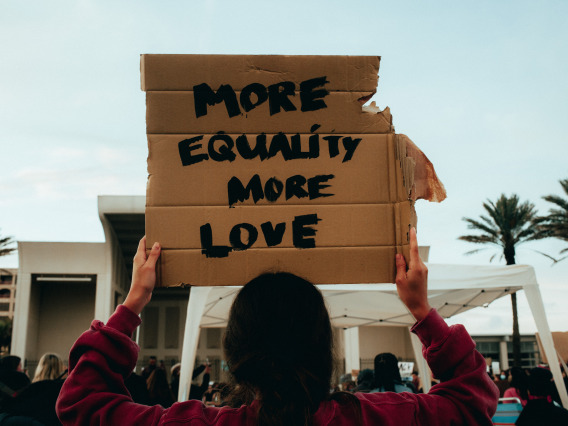As faculty, staff, and students in the Human Development and Family Science (HDFS) program, we recognize that historically underrepresented individuals and groups experience marginalization, exclusion, and hostility, even within our own institution. We are dedicated to inclusive and collaborative research, teaching, and outreach, and we are invested in making a difference in our academic and broader communities with a strengths-based approach to social justice. Our guiding values are equality, compassion, listening respectfully to all voices, and remaining hopeful as we work towards justice for all.
These values underlie our work to reduce inequality, promote inclusivity and honor the diverse experiences of all. Our learning environments are designed to promote connection with underrepresented and marginalized youth and families, and our principles encompass understanding all families and individuals, not simply those who are like us. We seek to be agents of social change across many spheres of influence. Through our research, teaching, and service, we commit to: (1) creating and promoting opportunities for all voices to be expressed in non-threatening environments; (2) developing and fostering relationships that encourage open communication and facilitate change; and (3) dismantling hidden structures of privilege and empower individual opportunity. In doing so, we acknowledge that striving for social justice is a challenging and sometimes uncomfortable process that requires continued commitment to individual growth and an awareness of our own privileges and imperfections along the way.
Moving forward, we take action with optimism and empathy for those who need support, listening to those whose voices are silenced or dismissed, and advocating for those who need advocates.

History of the HDFS Social Justice Statement
Although social justice has always been an important part of the HDFS program, the 2016 Presidential Election process brought about a new discussion and sense of urgency around the topic. In the beginning of the fall semester of 2016, the HDFS faculty decided to create a public statement that informed students, faculty, staff, and community members to the social justice-oriented mission of the HDFS program, including its curriculum, research, service, and outreach.
Faculty, staff and students met on January 13th, 2017 to create this statement with the help of Sara Gonzales from the UA Cultural Center. The meeting started with a discussion about our personal views of social justice and proceeded with working groups that came up with The Why (what was prompting the statement), The What (what work was being done already related to social justice), The Who We Are (how we view our department), and The Goals/Values (how we will help).
The Why discussion focused on events of the recent presidential election and overt threats to students’ liberties, such as the reversal of the Deferred Action for Childhood Arrivals (DACA) immigration policy, the proposed ban of social justice curriculum by the state of Arizona, and the 2010 Ethnic Studies Ban in Arizona.
The What and Who We Are discussions centered around the unique work and diverse perspectives represented in our department. The Goals/Values discussion focused on the ways we can improve and help facilitate more inclusivity and diversity within our department. The conversations we had were real and sometimes tense, forcing us all to listen to one another and work through the process.
At the end, we walked away with draft of our Social Justice statement, which was later finalized through multiple iterations of feedback with faculty, staff, and students.

